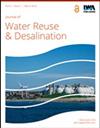深度学习算法通过氧化过程在咸水分析中产生光伏可再生能源
IF 2.3
Q2 Environmental Science
引用次数: 10
摘要
水果和蔬菜加工废水中颗粒物和有机物的含量决定了是否需要对其进行处理,以达到其预期用途的监管标准。本研究提出了一种利用氧化过程和深度学习技术进行盐水分析的基于光伏电池的可再生能源新技术。这里,盐水氧化是基于光伏电池的可再生能源进行的,盐水分析是使用基于马尔可夫模糊的Q径向函数神经网络(MFQRFNN)进行的。该计划完全面向网络,以便更好地控制和有效监测用水量。这种监测利用了一个通信系统,该系统以不规则间隔的时间序列的形式收集数据。基于水盐度数据,从准确性、精密度、召回率、特异性、计算成本和kappa系数等方面进行了实验分析。本文章由计算机程序翻译,如有差异,请以英文原文为准。
Deep learning algorithms were used to generate photovoltaic renewable energy in saline water analysis via an oxidation process
The amount of particles and organic matter in wash-waters and effluent from the processing of fruits and vegetables determines whether they need to be treated to fulfil regulatory standards for their intended use. This research proposes a novel technique in photovoltaic cell-based renewable energy in saline water analysis using the oxidation process and deep learning techniques. Here, the saline water oxidation is carried out based on photovoltaic cell-based renewable and saline water analysis is carried out using Markov fuzzy-based Q-radial function neural networks (MFQRFNN). The plan is entirely web-oriented to enable better control and effective monitoring of water consumption. This monitoring makes use of a communication system that collects data in the form of irregularly spaced time series. Experimental analysis has been carried out based on water salinity data in terms of accuracy, precision, recall, specificity, computational cost, and kappa coefficient.
求助全文
通过发布文献求助,成功后即可免费获取论文全文。
去求助
来源期刊

Journal of Water Reuse and Desalination
ENGINEERING, ENVIRONMENTAL-WATER RESOURCES
CiteScore
4.30
自引率
0.00%
发文量
23
审稿时长
16 weeks
期刊介绍:
Journal of Water Reuse and Desalination publishes refereed review articles, theoretical and experimental research papers, new findings and issues of unplanned and planned reuse. The journal welcomes contributions from developing and developed countries.
 求助内容:
求助内容: 应助结果提醒方式:
应助结果提醒方式:


